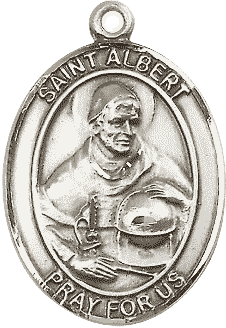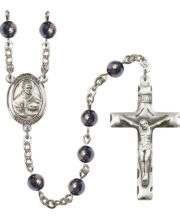Saints
St. Albert the Great Medal – Patron Saint of Scientists
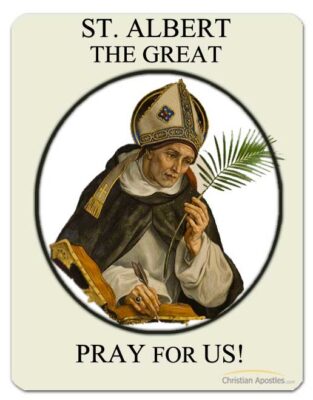 Albert of Bollstadt, known even in his own time as “the Great,” is a medieval saint whose life has a modern appeal. We are living in the Age of Science, and Albert is the only canonized saint who can truly be called a scientist. He was many other things, too, but it is his work in science that makes him unique. St. Albert the Great is the patron saint of Scientists and Philosophers. The Catholic Church celebrates the feast day of St. Albert the Great on November 15th. Learn more about one of the Church’s great saints, St. Albert the Great the patron saint of Scientists!
Albert of Bollstadt, known even in his own time as “the Great,” is a medieval saint whose life has a modern appeal. We are living in the Age of Science, and Albert is the only canonized saint who can truly be called a scientist. He was many other things, too, but it is his work in science that makes him unique. St. Albert the Great is the patron saint of Scientists and Philosophers. The Catholic Church celebrates the feast day of St. Albert the Great on November 15th. Learn more about one of the Church’s great saints, St. Albert the Great the patron saint of Scientists!
Biography of St. Albert
St. Albert the Great was a Catholic bishop and theologian who lived in the 13th century. He is also known as Albert of Cologne, Albertus Magnus and Albert the Great. He is considered one of the greatest minds of the Middle Ages, and is particularly renowned for his contributions to the field of natural science.
St. Albert was born in Swabia, Germany, in the year 1200. He was the eldest son of a noble family and received an excellent education. At the age of 15, he entered the Dominican order, where he began his studies in theology and philosophy. He was later sent to the University of Paris to continue his studies, and he quickly became one of the most celebrated scholars of his time.
St. Albert’s extensive knowledge of philosophy, theology, and science made him a respected teacher and theologian. He wrote numerous works on a wide range of topics, including logic, metaphysics, ethics, and natural science. His most notable work is “Summa Theologiae,” which is considered one of the most important works of medieval theology.
St. Albert’s legacy as a theologian, philosopher, and scientist was significant, and he is particularly renowned for his contributions to the field of natural science. He was the first person in the medieval era to identify and classify many different minerals, animals and plants, and his work in this area laid the foundation for modern botany, zoology and mineralogy.
In addition to his scholarly pursuits, St. Albert was also an influential church leader. He was appointed bishop of Regensburg in Germany and later served as the Provincial of the Dominican order in Germany and Bohemia. He was a strong advocate for the Catholic Church and used his position to promote the spread of Christianity and to combat the spread of heresies.
St. Albert was canonized by Pope Pius XI in 1931 and declared as a Doctor of the Church, he was recognized for his great learning and for his holiness of life. His feast day is celebrated on November 15th, and he is the patron saint of natural scientists, students, and philosophers.
St. Albert is considered one of the most important figures of the Middle Ages. His work laid the foundation for many of the scientific and philosophical advancements of the Renaissance, and his teachings continue to influence the Church and the world today.
In conclusion, St. Albert the Great was a Catholic bishop and theologian of the 13th century, he is considered one of the greatest minds of the Middle Ages, he is particularly renowned for his contributions to the field of natural science. He was canonized by Pope Pius XI in 1931 and declared as a Doctor of the Church. He was an influential teacher and church leader, He was a strong advocate for the Catholic Church and used his position to promote the spread of Christianity and to combat the spread of heresies. He is remembered as a patron saint of natural scientists, students, and philosophers. His work laid the foundation for many of the scientific and philosophical advancements of the Renaissance, and his teachings continue to influence the Church and the world today.
St. Albert the Great The Scientist Saint
Albert was born in the castle of Napping on the Danube River, in what is now Germany. The date of his birth is not certain; it may have been as early as 1193 or as late as 1206. His father was Count of Bollstadt. Blue eyed, light-haired, sturdily built Albert had an inquiring mind. He was interested in everything on the family estate, the wild and domestic animals, the birds, the insects, the plants, the stones, and the minerals.
When Albert was about seventeen, he was sent to the University of Padua. Here he met the future St. Dominic, founder of the Order of Preachers. Despite the opposition of his father, Albert joined the Order. He turned his back on wealth and on the life of a noble to serve God as a Dominican friar. After leaving Padua he taught philosophy and theology in several Dominican houses.
St. Albert is a Model for All Students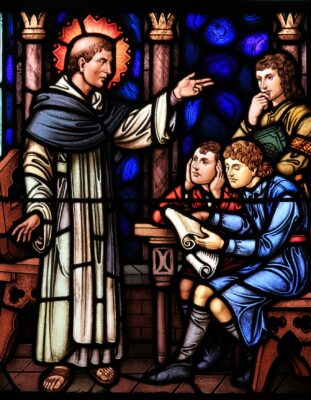
In 1240, Saint Albert was sent to the University of Paris where he took a master’s and then a doctor’s degree in theology. In 1248 Albert was sent to Cologne where he established a new university for the Order. Albert was primarily a philosopher and a theologian, but he had a great interest in everything that God created. He read all the books he could find about the natural sciences, but he did not accept everything he read.
He made his own observations and experiments. In his writings, he corrected many errors which had been handed down from generation to generation. For centuries, for example, people had believed that eagles wrap their eggs in fox skins and leave them in the sun to hatch. Albert was able to correct this by a personal observation of the habits of eagles. In such ways, he added to the sum total of human knowledge and prepared the way for modern science with its motto of: “Observe. Investigate. Experiment.”
In the field of geography, Albert traced the chief mountain ranges of Europe, explained the influence of latitude on climate, gave a physical description of the earth, and told why he believed the earth to be spherical in shape. He also wrote treatises on biology, botany, physics, chemistry, astronomy, and mineralogy. In all, his writings comprise thirty-eight volumes, which include biblical and theological treatises and sermons. This is not to say that Albert’s scientific writings were always accurate. In some cases he did not have the opportunity of making a personal investigation and had to accept the faulty findings of others.
St. Albert’s Studies
At times he did not have all the knowledge he needed to make a proper evaluation of his findings. But he was far ahead of his time, and scientists who followed him owe him a great debt. Albert’s greatest scholarly contribution was in rewriting the works of Aristotle so as to make them acceptable to Christian critics and in applying Aristotle’s methods and principles to the study of theology. This was the foundation of scholastic philosophy, which was brought to perfection by Albert’s pupil, St. Thomas Aquinas.
Thomas was a young Dominican studying at the University of Paris when Albert first met him in 1244. Later, Thomas studied under Albert at Cologne. One of the glories of Albert is the part he played in the intellectual and spiritual development of Thomas. When Thomas died in 1274, Albert was so grieved that he said “The light of the Church has gone out.” Thomas was the most famous in a large number of noted scholars who were students of Albert the Great.
Albert loved learning, but he was not permitted to live solely the life of a scholar. In 1254 he was elected Provincial Superior of the Dominicans in Germany. In 1256 his superiors sent him to Rome to represent the Dominicans in a famous controversy concerning mendicant orders. In 1260, much against his wishes, he was named Bishop of Ratisbon, now Regensburg, in Germany.
He traveled all over his diocese on foot, in all kinds of weather, and earned the nick name of “the bishop with the boots.” After two years of this, he was permitted to resign and return to his teaching at Cologne. The next year he was called from his work to preach a Crusade to the German people. His superiors appointed him prior first in Wurzburg, then in Strassburg, and afterward in Cologne. He took an active and important part in the Council of Lyons in 1274.
Defender of the Faith
In 1277, word reached Albert that the Bishop of Paris was urging the condemnation of several theses that had been advanced by the recently deceased Thomas Aquinas. Albert was old and in poor health, but he walked all the way from Cologne to Paris to defend the theses. He presented his case well but could not avert the local condemnation of certain points. He then walked back to Cologne. (The theses are not condemned today anywhere.) This was his last long walk.
In 1279, he seemed to have suffered a stroke, for his physical powers and most of his mental powers left him. However, he retained the power to pray until his death, which took place in his cell on November 15, 1280. The scientist Albert well realized the limitations of the material world and the limitations of man’s power to observe and reason. He knew that faith alone gives certainty and that faith is a gift from God. Natural science, he knew, can deal only with what is clear in outline; it has nothing to do with the world of love and pity. For this reason,
Albert had a very great devotion to our Lady, who is a veritable fountain of love and pity. In 1931, Pope Pius XI proclaimed Albert a Saint and Doctor of the Church. In 1941, Pope Pius XII named him patron of those who devote themselves to the natural sciences.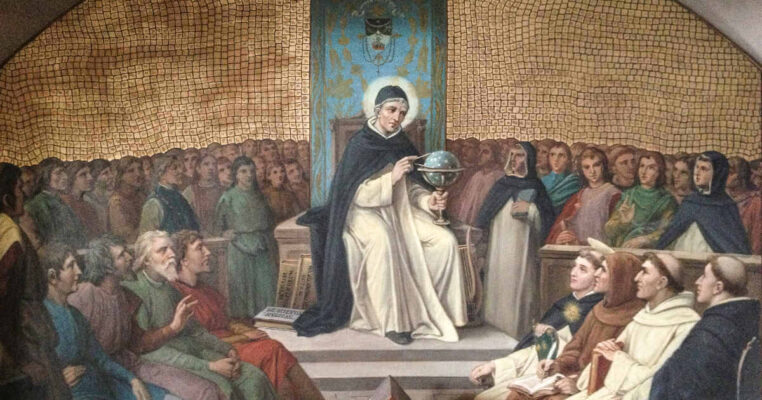
OTHER SAINTS OF THE SAME NAME:
You may also be interested in learning more about St. Martin of Tours the Soldier Saint.
- St. Albert of Montecorvino, died 1127. Bishop of Montecorvino. Feast Day: April 5.
- St. Albert of Louvain, 1166-1192 Bishop of Rheims, martyr. Feast Day: November 21
- St. Albert of Bergamo, died 1279. Peasant farmer remarkable for patience and charity. Feast Day: May 11.
Prayers to St. Albert the Great Scientist Saint
Heavenly Father, you made St. Albert the Great, by enabling him to combine
human wisdom and Divine Faith. We ask you heavenly Father to allow St.
Albert the Great to come to our assistance as we study and prepare for our
Finals and Exams. We ask the blessed Mother Mary to intercede on our
behalf, in not only bringing us closer to her Son Jesus, but also to take us to
Jesus along with St. Albert the Great, the patron Saint of Students.May our knowledge that we work so hard to gain in our Colleges and
Universities bring us ever closer to Jesus, and may our knowledge be of
service to building up the Kingdom of God. May all we do glorify God as
we work toward a higher education. May St. Albert the Great help ease
our anxiety as we study, prepare, and take our finals. All this we ask in Jesus
name, Amen.St. Albert the Great, pray for us!
Prayer of intercession as you put on your St. Albert Medal
O God, who did richly adorn St. Albert with your heavenly gifts and decorated him with all virtues, grant that, following in his footsteps, we may persevere in your service until death and securely obtain an everlasting reward. Through Jesus Christ, your Son, our Lord. Amen.
St. Albert the Greatis the patron saint of scientists and students
St. Albert the Great is the patron saint of scientists, naturalists, and philosophers. He is known for his extensive knowledge and writings on natural science, philosophy, and theology. He was also a teacher and mentor to the famous philosopher and theologian, Thomas Aquinas. St. Albert was canonized by Pope Pius XI in 1931. He is recognized as a Doctor of the Church, which is an honor given to saints who have made a significant contribution to theology or doctrine.
Reflection on the feast day of St. Albert the Great
St. Albert the Great’s feast day is November 15th.
St. Albert the Great, also known as Albertus Magnus, was a Catholic bishop, theologian, and scientist who lived in the 13th century. He is considered one of the most important figures in the history of science and philosophy, as well as a patron saint of scientists and natural philosophers.
On his feast day, we remember not only his contributions to the field of science and philosophy, but also his deep faith and commitment to God. As a Dominican friar, St. Albert dedicated his life to the pursuit of knowledge and understanding, not just for the sake of knowledge itself, but as a means of better understanding and serving God.
One of the most remarkable things about St. Albert was his ability to integrate his faith and his scientific pursuits. He believed that all truth, whether it be scientific or spiritual, ultimately comes from God, and that by studying the natural world, we can come to a deeper understanding of God’s creation and his plan for us.
As we celebrate St. Albert the Great’s feast day, let us be inspired by his example to seek knowledge and understanding, not just for our own sake, but as a means of drawing closer to God and serving him more fully. Let us also remember his teaching that the pursuit of knowledge and wisdom is not an end in itself, but a way to deepen our faith and understand God’s creation.
In this way, we can take inspiration from St. Albert and become true seekers of knowledge and wisdom, who, as he once said, “”seek not to understand that we may believe, but believe that we may understand.””
Discover more biographies, prayers, and reflections for more than 400 Catholic Saints“
Popular St. Albert Items
A St. Albert medal or a St. Albert rosary is a perfect gift to give to a young man who has chosen St. Albert as their confirmation name. As the patron saint of scientists and students, wearing a St. Albert medal daily is a perpetual prayer for Saint Albert to intercede on behalf of the wearer. As saints are united closer to God, their prayers are more efficacious, and enriches your own prayer.
Additionally, a Saint Albert pendant is a reminder to emulate the example of the holy saint as you study the sciences. What a beautiful testament of faith to share with the world, or to keep discretely tucked under your clothes. During the challenging moments of your day, reflect upon the holy life of St. Albert and pray for their intercession and protection.
Patron Saints - A's
Saints Similar to St. Albert the Great
You may also be interested in reading the Biography of St. Thomas Aquinas and the Biography of St. Bonaventure. St. Albert the Great, St. Thomas Aquinas, and St. Bonaventure are all prominent figures in medieval Christian philosophy and theology. St. Albert the Great was a teacher of St. Thomas Aquinas and made significant contributions to natural philosophy and theology. St. Thomas Aquinas is renowned for his Summa Theologica, and St. Bonaventure was a Franciscan scholar and theologian. Next up: Biography of St. Alexander Sauli
Also check out our handmade St. Albert the Great Medal and St. Albert the Great Rosary and St. Albert the Great Rosary Bracelet.

